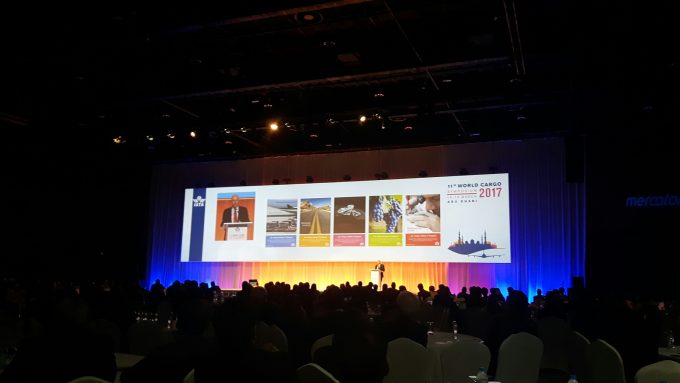Zimbabwe growers appeal for air cargo capacity – or will switch to ocean
Zimbabwe’s fruit and vegetable growers are searching for airfreight capacity to Europe – or will ...

An upbeat air cargo industry is this week celebrating a return to growth and noted positive structural changes that had seen some goods switch to air.
But the mood was tempered by political “protectionist rhetoric” and the possibility of trade wars.
Speaking this morning at the World Cargo Symposium in Abu Dhabi, George Anjaparidze, IATA’s senior economist, noted that while world trade remained weak last year, it was outperformed by air cargo for the second time since 2010.
“There is room for cautious optimism for a moderate acceleration of ...
Ecommerce air traffic to US set to grind to a halt as de minimis exemption ends
Maersk u-turn as port congestion increases across Northern Europe
Apple logistics chief Gal Dayan quits to join forwarding group
Widespread blanked sailings stave off major collapse of transpacific rates
Transpac rates hold firm as capacity is diverted to Asia-Europe lanes
Airlines slash freighter capacity post-de minimis, but 'the worst is yet to come'
Houthis tell Trump they will end attacks on Red Sea shipping
MSC revamps east-west network as alliance strategies on blanking vary
Maersk Air Cargo sees volumes fall as it aims for 'margin in favour of revenue'
India-Pakistan 'tit-for-tat' cargo ban sparks sudden supply chain shocks
Containership charter market feels the ripples from trade tensions
Gemini Cooperation carriers steam ahead of rivals in reliability stakes
Changing shipment origin won't wash: US CBP turns away whole truckloads
Expeditors reports healthy growth in a 'frenzied landscape of tariffs'
Tariff on imported products for drugs would be hard for US pharma to swallow
Atlas Air stays bullish on US change: 'we're flexible, we can fly to other markets'

Comment on this article